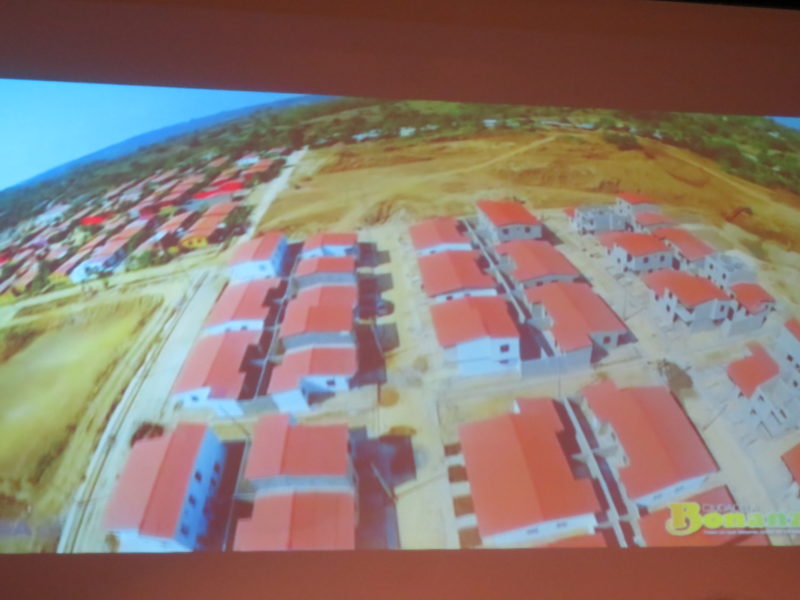
In 1975 I sat on a public bus in Colombia discussing neo-Marxism in general and Antonio Gramsci in particular with my seat mates, strangers who spoke fluent English (to my nonexistent Spanish.) What I most vividly remember is my embarrassment bordering on shame about my own idiotic assumptions about South American education – I held such narrow, negative stereotypes, all of which were dismantled in the 6 months I backpacked throughout South America.
In the German countryside where I grew up I did not always have access to sources that would open my eyes to the world. I’ve tried to find remedies ever since, and luckily those continue to be available where I live now. Specifically they often come in the form of political theatre or documentary film (this week’s topic) which intellectually instructs and emotionally scoops you up into worlds that are otherwise unknown to you.

Case in point were the workshops and performances of one of Mexico’s premiere small theatre groups Teatro Linea de Sombra, as experienced last week in PDX. Founded in 1993, the company, under the direction of Jorge A. Vargas and Alicia Laguna, focusses on the political and existential realities of marginalized populations in Mexico and Latin American countries. Simple props and stage sets are offset with a sophisticated sense for the visual, and modern technology (including powerful lighting by Blanca Forzan) seamlessly joins traditional theatrical craft in their performance.
http://www.teatrolineadesombra.com

Most striking, though, are the ways that their ideas (and I say “their” because these plays are collaboratively constructed) rope you into worlds of trauma and suffering, but also defiance and resilience that leave the rest of us in the dust. This was certainly true for their hallmark play Amarillo which received the Latin ACE Award for Best Foreign Production in New York, in 2012. Performed for international audiences as well as in multiple migrant centers along the routes of migration, the play describes the effects of migration, its associated risks, restrictions, dangers and promises, on those who leave and those who are left behind. https://www.youtube.com/watch?v=TGbnAfX9gDk

TLS often engages in years of research, sometimes, but not always, sponsored, to configure a topic. Out of many micro-stories collected by individual members of the troupe, they create a web of ideas from which eventually some dominant themes emerge that tell the story. Their approach to the violence experienced by the populations they encounter – often living with them or visiting extended amounts of time – is circuitous. Rather than representing the violence and trauma directly, in sync with the sensationalist media reports we all know, they present it indirectly via hints and metaphors and tangential narratives, for the most part.

I had the privilege to photograph the North American premiere of their new play Rebuilding Small Territories [Pequeños territorios en reconstrucción] which describes the construction of a small village in Colombia by women who were displaced by war, violence and, for some, the massacre of El Salado (http://www.nytimes.com/2000/07/14/world/colombians-tell-of-massacre-as-army-stood-by.html)
Told by actresses Zuadd Atala Ibánez and Alicia Laguna and with incisive concurrent translation by Ruth Wikler-Luker, the story focusses on the women’s determination to build their new homes, literally by pouring the necessary cement blocks and stacking them. A village emerges on donated land, self-governed and administrated by these women who refuse to be but victims. Out of 70 years of Colombian trauma emerges something empowered and empowering. And talking about power: Just watching those 2 actresses physically hauling cinderblocks across the stage until they add up to the 98 represented houses of the Cuidad de las Mujeres made me sweat. For Spanish speakers, here is a clip of an interview with the lawyer who helped these women to built peace. https://www.youtube.com/watch?v=3Ml0vlm4EGA




Characters used in the narrative are the cinderblocks, a hippo and letters without addresses – some of these pursue a linear path to describe the Colombian reality, others are in the guise of fables. In combination it keeps the viewers on their toes, grateful for the occasional sparks of humor when thinking and feeling are starting to overwhelm.


The Seattle Times generally describes the TLS’s work as “raw, tragic, unsparing, poetic, vibrant.” I agree, but would add something else. The play I saw manages to translate intellectual, political, ideological concepts into something easily absorbed as something less cerebral. It forces the viewer into an empathetic response that resonates long after the visceral images disappear. In this sense, Teatro Linea de Sombra not only represents solidarity in its own work with the disenfranchised, but creates a path towards mobilizing the viewer’s solidarity with those we do not know but who are in need of our support. Not a small feat.



Which brings us back to Gramsci: His philosophy of praxis stressed the need for solidarity without borders, the need for international alliances and the creation of spaces for resistance. Rebuilding Small Territories is a large step in that direction.
Can’t wait to see new work from this company. Hopefully in a context where not all of my photos are struggling with too little light….




